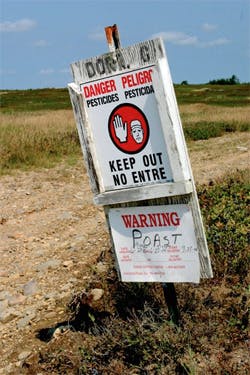Farmworker Justice Report Profiles Dangers of Pesticide Poisoning
A new report exposes the serious health risks faced by thousands of farm workers each year from pesticide exposure, and claims workplace regulations and standards fail to prevent the high rate of pesticide-related injuries, illnesses and deaths.
“Each year pesticide exposure poisons as many as 20,000 farmworkers, yet regulations to protect these vital workers have not been updated to address this growing problem,” said Virginia Ruiz, director of Occupational and Environmental Health for Farmworker Justice. “These injuries, illnesses, and deaths are preventable by taking the necessary steps to protect our farm workers and their families.”
Pesticide exposure causes farm workers to suffer more chemical-related injuries and illnesses than any other work force nationwide. Short-term effects of pesticide exposure include stinging eyes, rashes, blisters, blindness, nausea, dizziness, headache, coma and even death. Long-term impacts include infertility, neurological disorders and cancer. Not only are farm workers subjected to these risks, but their families – who live in nearby communities and attend schools neighboring the fields – face the same dangers.
The report offers recommendations to improve the safety of American farm workers and their families, including:
- Update worker protection standards that require more frequent and thorough pesticide safety training, provide medical monitoring of workers exposed to pesticides and improve safety precautions to limit contact with pesticides, particularly for pesticide handlers.
- Create Spanish translations of pesticide labels.
- Create buffer zones around schools and residential areas to protect farm worker families who are exposed through aerial drift.
- Establish a national reporting system of pesticide use and poisonings and provide increased funding to research the health effects of repeated pesticide exposure.
“Just as we establish standards and regulations to protect workers in every industry, we must address the health and safety of the farm workers who labor each day to put food on our tables,” said Ruiz. “Current workplace regulations are failing to keep American farm workers safe.”
About the Author

Sandy Smith
Sandy Smith is the former content director of EHS Today, and is currently the EHSQ content & community lead at Intelex Technologies Inc. She has written about occupational safety and health and environmental issues since 1990.

